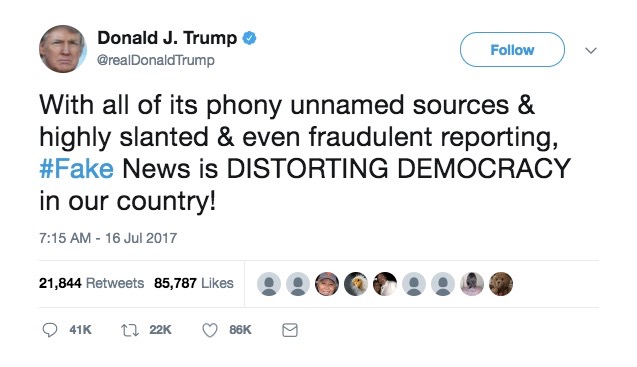US – #WeeklyAddress July 10-16: White House limits flow of information
Reporters Without Borders (RSF) remains concerned by the most recent threats to press freedom in the US during the week of July 10-16.
1. Free speech law center sues President for blocking Twitter users
On Tuesday, July 11, the Knight First Amendment Institute filed a lawsuit that accuses the White House of suppressing dissent by blocking Twitter users from President Donald Trump’s private Twitter account, @realDonaldTrump. The lawsuit, which was filed by seven people who have been blocked by Trump in addition to the Knight Institute, argues that the president’s Twitter feed is an “important forum for speech,” and that blocking users critical of him and his policies is unconstitutional. It refers to a recent Supreme Court ruling that recognizes Twitter as one of the “most powerful mechanisms available to a private citizen to make his or her voice heard,” and the use of the president’s account to make “formal statements” — as Press Secretary Sean Spicer, a defendant in the suit, confirmed in a June press briefing — as grounds for this lawsuit.
2. White House attempts to interfere with Correspondents’ Association
During a White House Correspondents’ Association (WHCA) town hall on Monday, July 10, WHCA President Jeff Mason said the President’s staff once asked him on behalf of the association to criticize a correspondent’s article on media access, a request that Mason refused. The correspondent, Politico’s Tara Palmeri, told CNN’s “Reliable Sources” on Sunday, July 16, that she had heard from her editor that the White House had threatened to remove her from the WHCA, which is not within their power given that the association is an independent organization. Palmeri’s story said President Trump did not hold a press conference during the nine days of his first international trip in May.
3. White House press briefings continue to be held off-camera
Deputy Press Secretary Sarah Huckabee Sanders held three press briefings this week, all of which were off-camera and banned live audio recordings. This follows a trend away from press access in the White House, where the last on-camera briefing was held more than two weeks ago on June 29. In response to these restrictions to access, Representative Jim Himes (D-Conn.) introduced “The Free Press Act” on Thursday, July 13, a bill that would require the White House to hold at least two televised briefings per week. According to the Huffington Post, Himes’ office analyzed the American Presidency Project’s data on the number of briefings past presidents held by this point in their presidencies, and found that Trump’s staff has held 71 press briefings so far, compared to 114 under his predecessor.
4. Trump accuses news media in tweet of “distorting democracy”
On Sunday, July 16, Trump tweeted a number of insults at the news media. In one tweet, he wrote: “With all of its phony unnamed sources & highly slanted & even fraudulent reporting, #Fake News is DISTORTING DEMOCRACY in our country.” These attacks come days after news broke that his son, Donald Trump Jr., had met in June 2016 with a Russian lawyer. The emails exchanged between Trump Jr. and the lawyer appear to be the strongest evidence that the campaign attempted to collude with Russia during the presidential election

5. The New York Times asks a judge to drop defamation suit Sarah Palin filed against it
On Friday, July 14, The New York Times asked a judge to drop the lawsuit former Alaska governor Sarah Palin filed against it in the U.S. District Court for the Southern District of New York. The lawsuit said an editorial in The Times had accused Palin of inciting the shooting that left former Representative Gabby Giffords (D-Ariz.) seriously injured. The Times refuted her claim, saying there was not actual malice in the editorial, which was promptly corrected and for which the newspaper published an apology on social media. Lawyers for The Times also noted that the editorial referred not to Palin but to her political action committee, SarahPAC. “It is well established that defamatory words directed at a corporation or other entity simply do not give rise to a claim by the individuals associated with it,” the lawyers wrote in court papers.
The United States ranks 43rd out of 180 countries in RSF's 2017 World Press Freedom Index after falling 2 places in the last year.
For the latest updates, follow RSF on twitter @RSF_en



